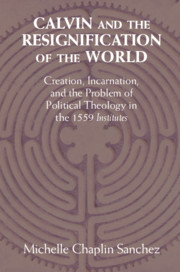 Calvin and the Resignification of the World
Calvin and the Resignification of the World Bibliography
Published online by Cambridge University Press: 12 March 2019
- Type
- Chapter
- Information
- Calvin and the Resignification of the WorldCreation, Incarnation, and the Problem of Political Theology in the 1559 ‘Institutes', pp. 288 - 310Publisher: Cambridge University PressPrint publication year: 2019


